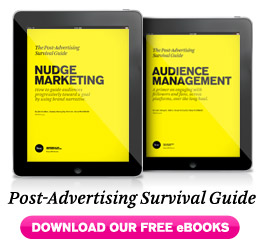Hundreds of millions of people have rejected advertising’s threats, pleas and arguments. So have the German courts. The digital ad biz needs to change its tune, its strategy and its leadership.
Another collective shudder rattled down the spine of the beleaguered ad business recently when a new study found “at least 419 million people are blocking ads on smartphones.” That’s a 90-percent jump in the past year, according to the May report from PageFair.
The study’s findings prove the ad industry’s war on ad blocking has been a total failure so far.
For nearly a year, the industry’s mouthpieces — particularly Randal Rothenberg, head of the U.S.-based Interactive Advertising Bureau (IAB) — have waged a hyperbolic and often highly personal war of words against ad blockers. In Germany, home of Adblock Plus, the world’s most popular ad-blocking software, the war also has involved multiple lawsuits, all of which have been rejected by the courts.
The empty words and losing legal actions have been completely ineffective because they share a set of erroneous beliefs and arguments that both the public and multiple German judges have dismissed as outmoded relics of a long-gone pre-digital era. As long as the ad industry’s pre-web mindset endures, the ad business is going to shrink while ad blocking and ad avoidance expand.
It doesn’t take a genius to see that the industry and its lobbyists, especially the IAB, now have to change their strategy. It’s time to stop weeping and foaming at the mouth; it’s time, instead, as a German court most recently suggested, to “innovate.” So far, the IAB and its adherents throughout adland have been unable or unwilling do that.
The wake-up calls keep comin’
It was an earlier Pagefair study in August 2015 that reported 200 million people were using ad-blockers, mostly on desktop browsers. Since all media are rapidly becoming primarily digital, this established an existential threat to advertising. The 2015 study awakened the ad industry to the undeniable fact that people do not like ads, particularly not on their phones. The new 2016 study reports “21% of the world’s 1.9 billion smartphone users have an ad-blocking browser installed.” Mobile browsers that block ads by default are most widespread in Asia, but rapidly going global.
The most recent alarm for the industry is the losing lawsuit against ad blockers by the large, widely respected media outfit that owns Munich-based daily Süddeutsche Zeitung, the daily newspaper largely responsible for breaking the Panama Papers stories.
Süddeutsche’s lawsuit had claimed that Adblock Plus’s “acceptable ads” policy is illegal because AdBlock Plus, owned by German company Eyeo GmbH, charges big advertisers a fee to “whitelist” or unblock certain of their ads. Adblock says it is simply enforcing standards that make ads less burdensome and more “acceptable” to people.
Adblock Plus’s practice has been denounced by IAB head Rothenberg as “an old-fashioned extortion racket.” But a regional German court reviewed the evidence recently and found that what’s really old-fashioned is the ad industry’s arguments and the conduct of the entire advertising and ad-supported publishing and broadcasting business.
As the website ars technica UK reported, “The Munich regional court said that ‘the law does not exist to save or uphold publishers’ business model(s). Rather…it is up to them to innovate.’ ”
The Donald Trump of Digital?
Rothenberg apparently believes complaining, calling people names and bending or obscuring the truth is better than innovating. It’s almost enough to earn him the “Donald Trump of Digital” designation.
In a September 2015 speech, Rothenberg, speaking to and for his trade group, initially reacted to the rise of ad blocking by calling Adblock Plus’s leadership “an unethical, immoral, mendacious coven of techie wannabes….”
Rothenberg also has mawkishly tried to characterize adland as the bulwark of “diversity and freedom of expression,” as if advertisers were some sort of selfless source of funding for all free speech. He leans hard on what he imagines to be the free speech rights of his trade group’s members, even though advertising (so-called “commercial speech”) is regulated in the U.S. and does not enjoy all the First Amendment protections of other speech. He decries the “ethics of ad-blocking technology,” but does not speak of the audience’s rights.
Challenging the very notion of the IAB’s “ethics” argument, one audience member tweeted to me in reaction to Rothenberg’s statements, “What about the ethics of abusing users with shitty ads?” Others people, more pragmatically, are asking what right the ad industry has to force people to pay data charges to download slow-loading, unwanted, data-heavy ads. (The New York Times did an excellent study of this problem last fall.)
But Rothenberg’s biggest mistake appears to be his reliance on the old business models and outdated ideas that have driven the ad industry since the 19th century. In a September 2015 post for Advertising Age, for example, he quotes two “Nobel laureate economists” asserting, “Advertising helps the economy function smoothly,” and “keeps prices low….” He doesn’t disclose, however, that the economists made these assertions in a white paper commissioned by the ad industry’s lobbyists to support arguments against limiting or ending tax deductions for advertising expenditures. The ad industry white paper was written as early as 1989 and offered as testimony to a House subcommittee in 1993, according to congressional records.
Apart from being bought and paid for by the advertising lobby, these 25-year-old arguments are based on economists’ pre-web and pre-internet theories that ads provided consumers with product information not readily available anyplace else. While that may have been partly true in the 19th and most of the 20th century, it lost all validity in the last two decades.
Billions of people now have vast, globally-connected information resources in their pockets; when they want to know or buy something, they search for real information about it. They no longer need or want most ads, which they increasingly perceive as untrustworthy as well as intrusive and unnecessary. The rise of ad blockers is more than sufficient proof that more and more people believe they get no useful information from ads.
If the ad biz’s view of advertising’s macro-economic role predates the Internet, some of its other arguments appear to pre-date electricity.
The right to do right
At the core of the ad industry’s arguments against ad blocking is the decidedly old-fashioned notion that ad-blocking software violates an unwritten agreement between publishers and their audiences that requires the audience to view all the ads as payment for viewing the content the audience actually wanted to see. The German courts now have considered this argument and they find it lacking.
In its publicly posted ruling favoring ad blockers, the Munich regional court said, ““Even companies in the media sector have to face the challenges of the market, the rights of freedom of economic activity, and innovation.…”
Reacting to the ruling, Ben Williams, Adblock Plus’s communications guy, jubilantly explained in a blog post, “In particular, the court said that there is no ‘contract’ between publishers under which users have somehow ‘agreed’ to view all the ads a publisher serves. To the contrary, said the court, users have the right to block those or any ads, because no such contract exists.”
The ad industry, of course, does have rights, as Rothenberg argues. It has the right to keep blustering and believing in imaginary contracts and outdated business models. But it also has the right to reinvent advertising for a post-advertising age.
Such a reinvention is the heart of the growing critique of the entire ad business. I have advanced this critique a number of times, most recently in a piece titled “The Audience Takes Charge” for the Content Marketing Institute’s magazine and blog.
This critique in delivered with particular intelligence and detail in Beyond Advertising, an authoritative new book from Wharton’s prestigious Future of Advertising Program. The book envisions a new “mental model” for the industry — a model where brands work on behalf of their audiences to deliver content (and products) with value instead of delivering ads that make unsupported or undistinguished product claims. (Interestingly, Will Smith (Yes, the actor.) seems to be making much this same point in own style at Cannes.)
The new kind of ad: helpful, useful, entertaining
This new model is vividly on display in the marketing of a growing number of brands. Red Bull, of course, was one of the first modern brands to rely almost exclusively on valuable, contagious content and to shun traditional ads. One of the best newcomers to this practice is Casper, the Zappos (or Uber, as the Wall St. Journal insists) of mattresses, which is creating an e-commerce brand with a good product, a good price (less than $1,000), free shipping, “100-night”” free trials and free returns, and a relatively small marketing budget that pays for a robust social media practice and lots and lots of journalism-style content.
Casper’s Pillow Talk blog on the company’s main website talks about sleep and talks up Casper products with an editorial tone that includes frank admissions that Casper is trying to sell you a mattress (and a pillow and sheets). The company also funds a year-old, journalistic effort called Van Winkle’s that claims (and seems to have) editorial independence. The sleep news site almost fails to mention Casper, but it intends to “own sleep” editorially, as various Casper execs and Van Winkle’s staffers have told the Wall St. Journal and Buzzfeed News, among others.
The only traditional ads supporting Casper’s helpful, entertaining content appear to be a modest but clever out-of-home campaign that has included posters in the New York subway system. The Wall St. Journal reports that Casper and its fellow online mattress companies have “cracked into the $14 billion U.S. mattress industry.” So far, this has been accomplished in a largely ad-free effort.
Advertising as helpful content is the future. At the moment, so-called content marketing is still only about 4% of the total annual global marketing spend, which stands at roughly $1 trillion, according to a 2015 year-end estimate by GroupM, WPP’s global media buying conglomerate. But content-as-advertising is growing more and more rapidly, fueled now by the explosive growth in ad avoidance.
Pointing to Casper and a hundred more examples, I would mildly suggest to Rothenberg and the entire ad industry that innovation is actually possible; advertising can inform and assist instead of blathering, interrupting and wasting people’s time and money. Digital ad-makers should quickly exercise their right to abandon shouted product claims. It’s past time to change course, put the audience first and turn ads into value-adding content that earns and deserves people’s attention. As the growing numbers of ad blockers and the multiple losing court cases demonstrate, nothing else is likely to work.
Note: This piece originally appeared on Medium. It reprises some of the themes of a keynote address I gave in June 2016 at the European Content Marketing Forum’s Best of Content Marketing conference in Hamburg, Germany. My thanks to Michael Höflich, CMF’s director, the board of CMF and everyone who helped put on such a great gathering.


